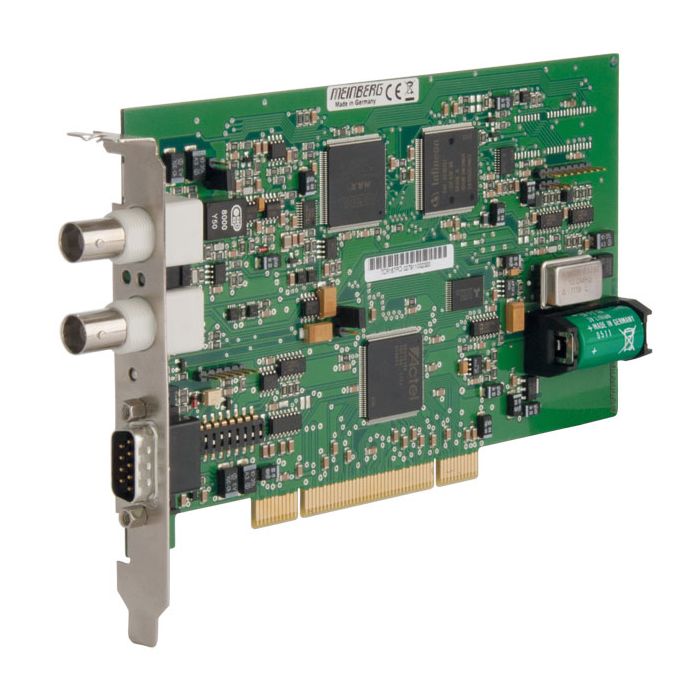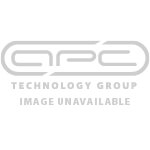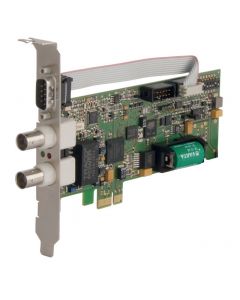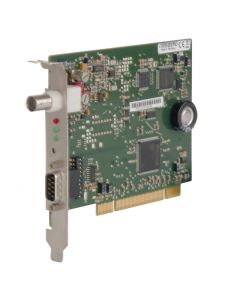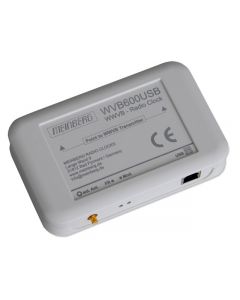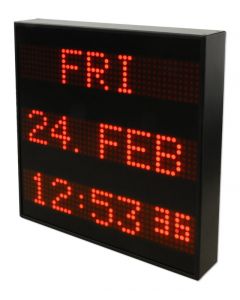
TCR167PCI
TCR167PCI
Meinberg
IRIG Time Code Receiver and Generator for Computers (PCI/PCI-X bus)
The TCR167PCI receives IRIG-A/B or AFNOR time codes and can be used for synchronizing the system time of its host PC. The IRIG output of this card can generate an IRIG signal for other IRIG time code readers. The output format is independent from the incoming IRIG signal - a perfect solution to your IRIG conversion requirements.
Contact us for Lead Time
Click below to request a quote for this item. Or for product advice, stock and lead time enquiries call our team on 0330 313 3220.
| Attribute | Value |
|---|---|
| Manual URL | https://www.meinbergglobal.com/download/docs/manuals/english/tcr167pci.pdf |
| Relative Humidity | Max. 85% |
| Further information |
The board TCR167PCI has been designed to receive and to generate IRIG and AFNOR time codes.
It is used in applications like data acquisition, standalone computer time Synchronisation (for systems without a network connection or higher accuracy requirements) or as an IRIG converter device. Receiver: the module provides two input channels for decoding of modulated and unmodulated time codes in IRIG-A/B or AFNOR format. The receiver's automatic gain control (AGC) allows the reception of modulated IRIG signals within an amplitude range from 600 mVpp to 8 Vpp. In addition, the TCR167PCI provides an optocoupler input for decoding unmodulated codes with TTL- or RS-422 level for example. The board can be delivered with an optical input for unmodulated codes optionally. The decoded date and time can be read via the PCI/PCI-X bus interface and is also transmitted via the board's RS-232 port. A buffered real time clock keeps time and date after power down. Generator: the board TCR167PCI can generate time codes in IRIG-B or AFNOR format. These signals are provided as modulated (3 Vpp/1 Vpp into 50 ohm) and unmodulated (TTL into 50 ohm and RS-422) time codes. An optical output for unmodulated codes is available on request. The independent configuration of the time code and its offset to UTC of the receiver and the generator allows the use of TCR167PCI for time code conversion applications. The drivers package for Windows contains a time adjustment service which runs in the background and adjusts the Windows system time continuously and smoothly. A monitor program is also included which lets the user check the status of the device and the time adjustment service, and can be used to modify configurable parameters, if run with administrator rights. The driver packages for Linux and FreeBSD contain a kernel driver which allows the board to be used as a reference time source for the NTP daemon which is shipped with most Unix-like operating systems. This also turns the computer into an NTP time server which can also provide accurate time to NTP clients on the network. Some command line tools can be used to setup configurable parameters and monitor the status of the board. For usage of the card on other operating systems please contact Meinberg support: [email protected]. The device's serial port is not required for operation but can be used to update the card's firmware, or provide another computer with the current time via a serial time string. If you are going to use the TCR167PCI in your own applications, please download our SDK which shows how to access the card from within your software. All drivers and API sample source code can be downloaded free of charges from our website and we are happy to assist you if you face any difficulties in using the Meinberg driver API in your software development process. |
| Product Type | PC/PCIX Clocks |
| Interface | Single serial RS-232 interface |
| Status info | 2 status LEDs for indication of: detection of a correct code, Synchronisation of the internal timing and holdover mode |
| Pulse outputs | Pulses per second (RS-232/TTL level) and per minute (TTL level), pulse duration 200 msec |
| Data format of interfaces |
Baudrate: 300, 600, 1200, 2400, 4800, 9600, 19200, 38400 baud
Framing: 7E2, 8N1, 8E1, 8N2 Output string: 32 ASCII characters with date, time and status information |
| Generated Time Codes |
IRIG B002: 100pps, DCLS signal, no carrier, BCD time of year
IRIG B122: 100pps, AM sine wave signal, 1 kHz carrier, BCD time of year IRIG B003: 100pps, DCLS signal, no carrier, BCD time of year, SBS time of day IRIG B123: 100pps, AM sine wave signal, 1kHz carrier, BCD time of year, SBS time of day IRIG B006: 100 pps, DCLS Signal, no carrier, BCD time-of-year, Year IRIG B126: 100 pps, AM sine wave signal, 1 kHz carrier frequency, BCD time-of-year, Year IRIG B007: 100 pps, DCLS Signal, no carrier, BCD time-of-year, Year, SBS time-of-day IRIG B127: 100 pps, AM sine wave signal, 1 kHz carrier frequency, BCD time-of-year, Year, SBS time-of-day IEEE1344: Code according to IEEE1344-1995, 100pps, AM sine wave signal, 1kHz carrier, BCD time of year, SBS time of day, IEEE1344 expansion for date, time zone, daylight saving and leap second in Control Functions Segment C37.118: Like IEEE1344 - with turned sign bit for UTC-Offset AFNOR: Code according to NFS-87500, 100pps, AM sine wave signal, 1kHz carrier, BCD time of year, complete date, SBS time of day |
| Electrical Connectors |
Female BNC-connectors male 9-pole D-Sub connector |
| WEEE status of the product | This product is handled as a B2B category product. In order to secure a WEEE compliant waste disposal it has to be returned to the manufacturer. Any transportation expenses for returning this product (at its end of life) have to be incurred by the end user, whereas Meinberg will bear the costs for the waste disposal itself. |
| Available Output Signals | Modulated IRIG-B or AFNOR signal, 3 Vpp (high) and 1 Vpp (low) into 50 ohm unmodulated (DC Level Shift) IRIG-B or AFNOR signal, TTL into 50 ohm and RS-422, active high or active low selectable by jumper |
| Accuracy Free run | ±1·10E-8 if the decoder was synchronous for at least 1 h |
| IRIG Time Code Input | IRIG - A132/A133, A002/A003, B122/B123, B002/B003, B126/B127, B006/B007, IEEE 1344, AFNOR NFS 87-500 and C37.118 (other codes on request) |
| Precision of timebase | ±5 µsec referred to IRIG-reference marker |
| Backup Battery Type | When main power supply fails, hardware clock runs free on quartz basis, life time of lithium battery min. 10 years |
| Board type | PCI card short (174,6 mm x 106,7 mm) |
| Input Signal |
Modulated IRIG A/B, IEEE1344 or AFNOR signal, input insulated by transformer, input impedance 50 ohm, 600 ohm or 5 kohm selectable by jumper
unmodulated (DC level shift) IRIG A/B, IEEE1344 or AFNOR signal, input insulated by photocoupler |
| Statusbyte | Information about holdover mode, Synchronisation since last reset and the validity of the RTC data. |
| Time Trigger Inputs | Triggered by falling TTL slope Time of trigger event readable via computer slot or optional second RS232-interface |
| Computer Interface | 33MHz- or 66MHz-PCI BUS (PCI-X) 32 Bit/3.3V or 5V card slot |
| Status Inputs | 2 status inputs, TTL level, readable via PCI/PCI-X bus |
| RoHS | Yes |
| Key Features |
Generation of IRIG-B or AFNOR time codes
2 time-trigger-inputs 2 TTL inputs for status information PCI LOCAL BUS interface, 3.3V or 5V, 33MHz or 66MHz, PCI-X compatible Plug and play Pulses per second and per minute RS-232 interface Status LEDs Reception of time code formats IRIG A/B or AFNOR Configurable time zone Driver software for all popular operating systems Optional optical input and/or output for time codes Optional DDS frequency synthesizer |
| Operating Temperature | 0 ... 50°C / 32 ... 122°F |
| Attribute | Value |
|---|---|
| Data Sheet | Click here to view |

